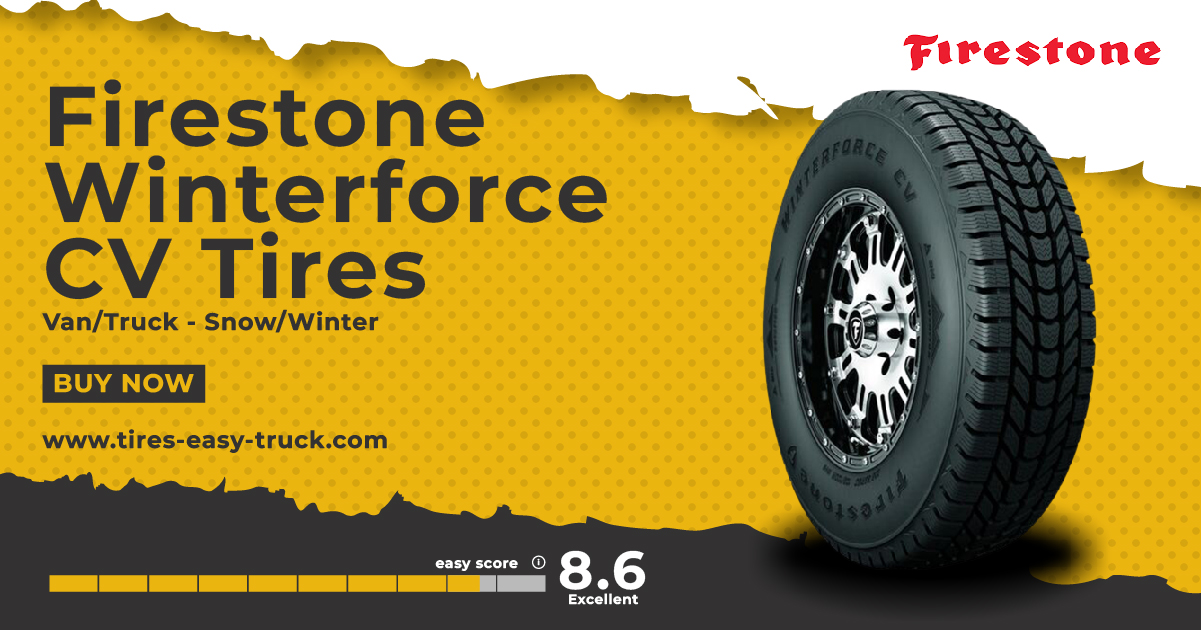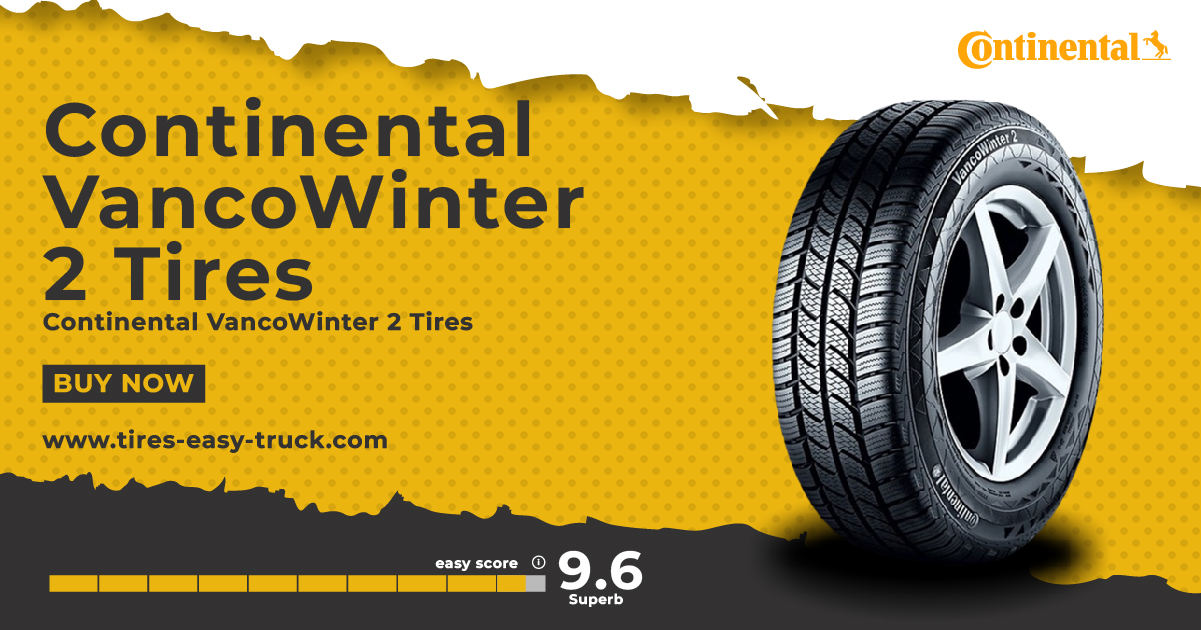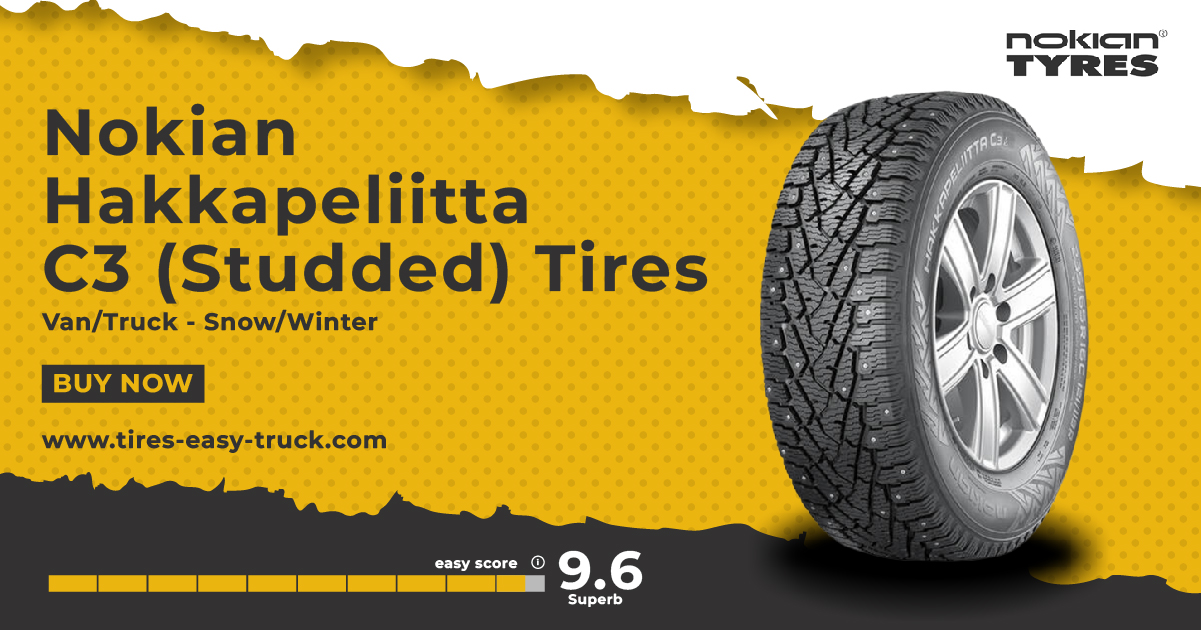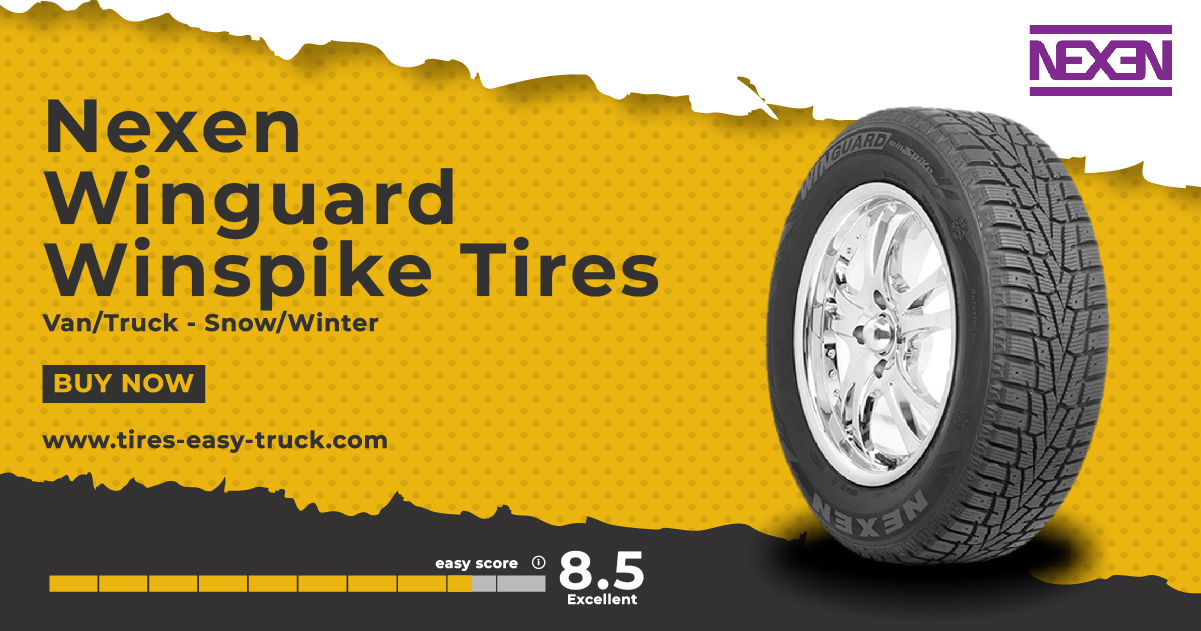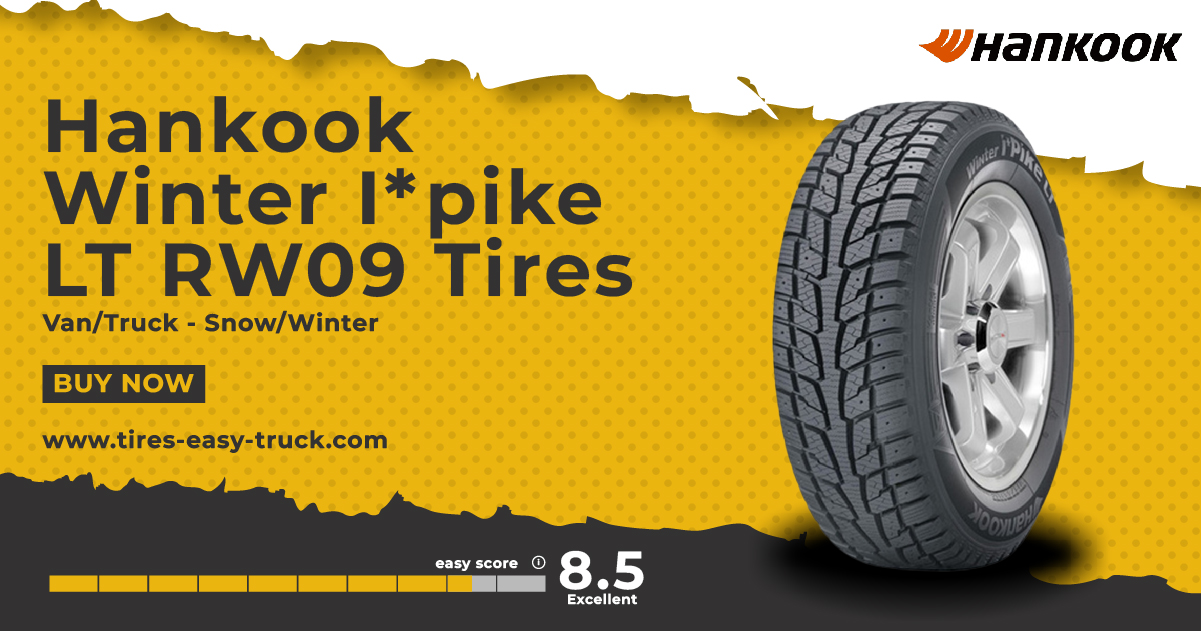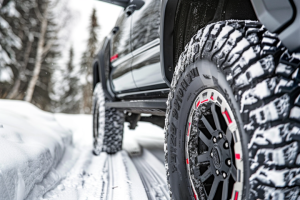Last Updated on September 14, 2025
The Importance of Best Winter Tires for Trucks and Understanding Their Key Features
Selecting the right tires is paramount to ensuring the safety and performance of trucks during the winter months. Winter tires, specifically designed to handle the adverse conditions of cold weather, icy roads, and snow, are essential for trucks that operate in such environments.
This entire article provides an overview of the importance of truck winter tires and delves into the features that distinguish high-quality winter tires. We’ll also discuss a few top truck tires this year and why you should purchase only high-quality tires from Truck Easy Tires. Ready for these and more? Then, let’s get started!
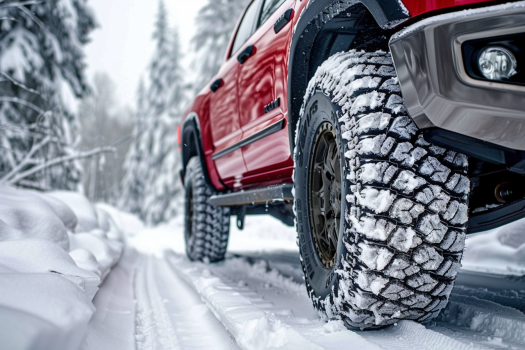
Why Winter Tires are Essential for Trucks: Understanding the Science and Comparing with All-Season Tires
The significance of winter tires for trucks extends beyond a mere seasonal tire change; it’s about ensuring optimal performance, safety, and reliability under winter driving conditions. But most of all, their importance cannot be overstated for several reasons:
- Enhanced Safety: Winter tires are engineered to provide superior traction, handling, and braking performance in cold, icy, or snowy conditions. This is crucial for trucks, as it significantly reduces the risk of accidents caused by slipping or skidding.
- Improved Performance: Unlike all-season tires, winter tires are made from a softer rubber compound that remains flexible at lower temperatures, ensuring better grip and control. This adaptability is essential for maintaining trucks’ performance when the temperature drops.
- Economic Efficiency: Using winter tires can also be economically efficient in the long run. Switching to winter tires during the colder months extends the life of your all-season or summer tires, and the improved traction of winter tires can lead to reduced fuel consumption.
- Legal Requirements: In some regions, winter tires are mandated by law during certain months. Compliance with these regulations avoids potential fines and ensures that trucks meet the safety standards required for winter driving.
The Science Behind Winter Tires and Traction
Winter tires are engineered based on scientific principles that address the unique challenges of cold weather, ice, and snow. The key to their effectiveness lies in two main areas: the rubber compound and the tread design.
Rubber Compound:
The heart of winter tire technology is the specialized rubber compound that remains flexible at low temperatures. Unlike the compound used in standard or all-season tires, which can become complex and less effective in cold weather, winter tire compounds are designed with a higher silica content. This flexibility allows the tire to conform better to the road’s surface, increasing the contact area and thus improving traction.
Tread Design:
Winter tires feature unique tread designs crucial for maneuvering through snow and over ice. Deep tread grooves and biting edges help to channel snow and slush away from the tire, preventing snow build-up and maintaining traction. Additionally, the high density of sipes (tiny slits) in the tread pattern increases the number of biting edges that grip the road surface, especially on ice.
Comparing Winter Tires vs. All-Season Tires: Benefits for Trucks
While all-season tires offer a compromise between summer and winter performance, they fall short of providing the safety and efficiency required for winter driving conditions. Here’s how winter tires stand out:
- Superior Traction: Winter tires offer excellent snow, slush, and ice traction compared to all-season tires. This is due to their specialized tread patterns and rubber compounds that maintain flexibility in cold temperatures.
- Better Handling and Braking: The enhanced grip provided by winter tires translates to better handling and shorter braking distances in winter conditions. This is critical for trucks that must maintain control and stability, especially when carrying heavy loads.
- Reduced Risk of Hydroplaning: Winter tires are designed to effectively channel water and slush away from the tire’s surface, reducing the risk of hydroplaning. This feature is essential for maintaining control on wet and slushy roads.
Top Winter Tires for Trucks in 2024: Leading the Way in Performance and Reliability
Selecting the right winter tires is a critical decision for truck owners and operators, as it directly impacts safety, performance, and efficiency during the challenging winter months.
As we head into 2024, several brands stand out for their exceptional qualities. They cater to various needs, from heavy-duty performance to energy efficiency and budget-friendly options. Here’s a closer look at the top winter tires for trucks in 2024, showcasing models from Bridgestone, Michelin, Goodyear, Continental, and Firestone.
Firestone Winterforce CV: For Budget-Friendly Quality
The Firestone Winterforce CV is excellent for truck operators seeking reliable winter tires without breaking the bank. This tire boasts a directional tread pattern designed to enhance traction on snow and ice. Additionally, its high-density siping ensures better grip, while the reinforced construction makes it ideal for commercial vehicles. The Winterforce CV embodies Firestone’s dedication to providing affordable yet effective winter tire solutions for trucks, delivering dependable performance in harsh winter conditions.
Continental VancoWinter 2 Tires: For All-Round Excellence
The Continental VancoWinter 2 tire offers a balanced combination of performance, safety, and comfort. Equipped with advanced winter technology, this tire features a tread pattern that maximizes road contact and a special Nordic compound that enhances grip on wet, snowy, and icy surfaces. The VancoWinter 2 also includes a low-noise design for a more comfortable driving experience, making it a versatile option for a wide range of trucks and winter driving scenarios. Continental’s commitment to quality is evident in this all-around excellent winter tire.
Nokian Hakkapeliitta C3 (Studded) Tires: For Enhanced Traction
Designed for superior traction, the Nokian Hakkapeliitta C3 studded tire is perfect for navigating icy and snowy roads. This tire features Nokian’s Winter Reactive Technology, which combines a flexible tread compound with advanced tread designs that include biting edges and sipes. These elements work together to provide improved handling and stability in cold temperatures. The Hakkapeliitta C3 is ideal for truck drivers who prioritize safety and control in severe winter conditions, offering enhanced performance where it matters most.
Nexen Winguard Winspike Tires: For Energy Efficiency and Longevity
The Nexen Winguard Winspike tire is renowned for its focus on energy efficiency and longevity. Operators who want to maximize their investment over the tire’s lifespan prefer this tire. The latest iteration of the Winguard Winspike features a tread design and rubber compound optimized for low rolling resistance, contributing to reduced fuel consumption and emissions. Its advanced compound maintains flexibility in extreme cold, while the tire’s design elements improve traction on ice and snow over time, even as the tire wears down.
Hankook Winter I*pike LT RW09 Tires: For Heavy-Duty Performance
The Hankook Winter Ipike LT RW09 tire is designed for heavy-duty performance, offering superior traction and durability for commercial trucks. This tire features an advanced tread pattern and a compound that remains flexible in cold temperatures, ensuring excellent grip on snowy and icy roads. The Winter Ipike LT RW09 includes high-density siping and a robust construction to handle the demands of heavy-duty use. Hankook’s commitment to quality and performance is evident in this tire, making it a top choice for truck operators who need reliable winter performance.
Features to Look for in Winter Tires for Trucks: Ensuring Safety and Performance in Cold Conditions
For truck owners and operators, choosing the right winter tires is crucial for maintaining safety, efficiency, and performance in harsh winter conditions. Winter tires for trucks are designed with specific features to tackle cold weather, snow, ice, and slush. Understanding these key features can help you select the best tires for your truck’s winter needs. That said, here are the major features of winter tires:
Tread Patterns
The tread pattern on a tire plays a pivotal role in winter performance. Winter tires for trucks are equipped with unique tread designs crucial for navigating through snow and over ice. Here are the specifics to consider:
- Deep Grooves and Open Tread Design: These features help efficiently evacuate snow and slush from the tire, preventing build-up and maintaining traction. The open tread design also aids in gripping the road better under snowy conditions.
- Biting Edges and Sipes: Winter tires have a high density of sipes, which are minor cuts in the tread blocks. These sipes create additional biting edges for improved grip on icy surfaces. The more biting edges a tire has, the better it can adhere to ice and packed snow.
Rubber Compounds Suitable for Cold Weather
The effectiveness of winter tires in cold temperatures largely depends on the rubber compound they are made from. This compound is formulated to remain flexible at lower temperatures, essential for maintaining traction on hard, icy, or snowy roads.
- Flexible in Cold Weather: Unlike those used in all-season or summer tires, the rubber compounds used in winter tires are designed not to harden as temperatures drop. This flexibility allows the tire to conform more closely to the road, providing better grip and handling.
- High Silica Content: Many winter tires feature a rubber compound with a high silica content, which helps maintain flexibility in cold conditions and improves wet traction.
Studying Options and When They’re Necessary
Studded winter tires have metal studs embedded within the tread. These studs provide additional traction on hard-packed snow and ice.
- Enhanced Grip on Ice: Studs’ main advantage is their ability to dig into the ice, offering superior traction in conditions where rubber alone might slip.
- Regulatory Considerations: It’s important to note that using studded tires is not legal in all jurisdictions due to the road wear they can cause. Before opting for studded tires, check local regulations to ensure compliance.
- Use Cases: Studded tires are best suited for regions with severe winter conditions, where roads are frequently covered in ice. They may not offer significant benefits over studless winter tires in milder conditions or on clear roads.
Load Ratings and Why They Matter for Trucks
The load rating is critical when selecting truck winter tires, indicating the maximum weight the tire can safely support.
- Support Heavy Loads: Trucks, especially commercial ones, often carry heavy loads, making it essential to choose tires with a load rating that matches or exceeds the truck’s maximum load capacity.
- Impact on Safety and Performance: Using tires with an insufficient load rating can lead to tire failure, decreased handling, and increased stopping distances, posing significant safety risks.
- Finding the Right Match: Refer to the truck’s owner’s manual or consult a tire professional to select winter tires with the appropriate load rating.
Winter Tire Maintenance and Care: Ensuring Longevity and Performance
For truck owners and operators, winter tires represent a significant investment in safety and performance during the colder months. Proper maintenance and care of these tires are crucial to maximizing their lifespan and ensuring they provide the best possible service each winter. So, it’s time to cover the essential aspects of winter tire maintenance, including proper installation techniques, seasonal storage tips, and regular maintenance checks and balancing, ensuring your tires remain in top condition.
Proper Installation Techniques
Correctly installing winter tires is the first step in ensuring their effectiveness and longevity. Here are some key considerations:
- Use a Full Set: Always install winter tires in four complete sets. Mixing winter tires with all-season or summer tires can lead to uneven grip and handling, which can be dangerous.
- Check Tire Pressure: Tire pressure decreases in colder temperatures, so adjusting the pressure according to the manufacturer’s specifications after installation is essential.
- Follow Torque Guidelines: Ensure the lug nuts are tightened to the vehicle manufacturer’s recommended torque specifications when installing winter tires. Incorrect torque can lead to safety issues or damage to the tire.
- Rotation Schedule: Follow a regular tire rotation schedule to promote even wear. Rotating tires according to the vehicle manufacturer’s recommendations can extend the life of the tires.
Seasonal Storage Tips for Winter Tires
Proper storage of winter tires during the off-season is critical to maintaining their condition. Here are some tips for practical storage:
- Clean Before Storage: Remove dirt, grime, or brake dust from the tires and wheels before storing them. This prevents corrosion or damage to the rubber.
- Store in a Cool, Dry Place: UV rays and heat can deteriorate rubber over time. Store your tires in a cool, dry, preferably dark place to prevent premature aging.
- Avoid Stacking: If possible, hang the tires or store them upright on a tire rack to prevent them from deforming underweight. If you must stack them, try to rotate the stack periodically.
- Use Tire Bags: Covering each tire in airtight plastic bags can help reduce the evaporation of oils from the rubber, keeping the tires in better condition.
Regular Maintenance Checks and Balancing
Consistent maintenance checks and balances are essential for the performance and safety of winter tires.
- Inspect Tires Regularly: Check for signs of wear and tear, such as cracks, bulges, or embedded objects. Early detection of issues can prevent further damage.
- Check Tread Depth: Ensure the tread depth exceeds the minimum legal requirement (usually 2/32 of an inch). Adequate tread depth is critical for maintaining traction in winter conditions.
- Balance and Align: Have your tires balanced and your vehicle’s alignment checked at the beginning of the winter season and after any incidents that could affect the tires, such as hitting a curb. Proper balancing and alignment prevent uneven wear and vibration.
- Monitor Tire Pressure: During winter, tire pressure should be checked monthly. Correct tire pressure ensures optimal tire performance and fuel efficiency.
Legal and Regulatory Considerations for Winter Tires on Trucks
For truck operators, navigating the legal and regulatory landscape regarding winter tire use is crucial for compliance, safety, and operational efficiency. Different regions have varying requirements and standards for winter tires, making it essential for those managing truck fleets or driving trucks to be well-informed about the laws that apply to their routes. That’s why you must understand the critical aspects of winter tire regulations across different regions.
Understanding Winter Tire Regulations Across Different Regions
Winter tire regulations can vary significantly from one jurisdiction to another, with specific laws dictating when and where winter tires must be used and the acceptable types of tires. Here are some general considerations:
- Mandatory Use Periods: Some regions specify specific dates when winter tires are compulsory for all vehicles, including trucks. These periods typically coincide with the expected winter weather conditions in the area.
- Geographic Requirements: In certain areas, especially those prone to heavy snowfall or icy conditions, the law may require winter tires for travel on specific roads or highways, regardless of the date or vehicle type.
- Tire Specifications: Regulations may also dictate specific requirements for the winter tires themselves, such as minimum tread depth, the inclusion of snowflake and mountain symbols (indicating that the tire meets specific snow traction performance requirements), and the use of studded tires.
- Studded Tire Regulations: Where allowed, studded tires may be restricted to specific dates or wholly banned in some jurisdictions due to the road damage they can cause.
Truck operators must research and understand their routes’ specific winter tire regulations. This information is typically available from local transportation authorities or government websites.
Compliance and Safety Standards for Trucks
Complying with winter tire regulations is a legal requirement and critical to maintaining high safety standards. Here’s why compliance and adherence to safety standards are vital:
- Enhanced Road Safety: Winter tire regulations aim to improve road safety by ensuring vehicles are properly equipped to handle winter driving conditions. For trucks, which can pose a greater risk due to their size and weight, using the right winter tires can significantly reduce the likelihood of accidents.
- Operational Reliability: Compliance with winter tire regulations helps ensure that trucks can operate without legal interruptions. This reliability is crucial for maintaining delivery schedules and avoiding potential fines or penalties for non-compliance.
- Insurance Implications: Failure to comply with winter tire regulations can affect insurance coverage. In the event of an accident, non-compliance could lead to denied claims or increased premiums.
- Reputation: Adherence to legal and safety standards, including those related to winter tires, is essential for commercial truck operators to maintain a positive reputation with clients and the public.
Purchasing Guide for the Best Winter Tires for Trucks: Maximizing Value and Support
Selecting the right truck for Winter tires involves more than finding a fit set. It ensures optimal performance, safety, and value over the tire’s lifespan. This comprehensive guide will navigate you through where to buy the best winter tires, how to evaluate the balance between price and performance, and what to consider regarding warranty and customer support.
Where to Buy the Best Winter Tires for Trucks
The marketplace for winter tires is vast, with options ranging from local tire shops to online retailers. Each has its advantages:
- Authorized Tire Dealers: Purchasing from authorized dealers ensures you get genuine, high-quality tires suitable for your truck. These dealers often directly associate with manufacturers, offering the latest models and technologies.
- Online Retailers: Online tire stores have become popular due to their convenience and often competitive pricing. Many offer a wide selection of brands and models, with detailed information and customer reviews to help inform your decision. Ensure the retailer is reputable and offers delivery to a professional installer or provides a network of installation partners.
- Wholesale Clubs and Auto Parts Stores: These outlets can offer competitive pricing and packages that include installation and additional services. Their selection may be more limited compared to specialized tire dealers or online stores.
When purchasing winter tires, consider proximity to the seller (for potential returns or service), installation services, and customer support. Always ensure the retailer provides authentic products with manufacturer warranties.
Conclusion
After thoroughly reviewing the best winter tires for trucks in 2024, it’s clear that having the right tires is crucial for safety, performance, and reliability during the colder months. Here are some top choices:
1) Firestone Winterforce CV: For Budget-Friendly Quality
2) Continental VancoWinter 2 Tires: For All-Round Excellence
3) Nokian Hakkapeliitta C3 (Studded) Tires: For Enhanced Traction
4) Nexen Winguard Winspike Tires: For Energy Efficiency and Longevity
5) Hankook Winter I*pike LT RW09 Tires: For Heavy-Duty Performance
Fortunately, at Truck Easy Tires, we know the importance of quality, reliability, and performance in winter tires. Our handpicked selection of top-tier winter truck tires ensures that truck operators stay safe and perform well, no matter the weather.
Transition to Truck Easy Tires
Are you ready to prepare your truck for the winter season with the best tires available? Visit Truck Easy Tires at https://www.tires-easy-truck.com/ to explore our comprehensive selection of winter tires specifically chosen for trucks. With our expertly selected range, detailed product information, and customer support, finding and purchasing your truck’s winter tires is straightforward and hassle-free. Equip your vehicle with the best winter tires today and drive with confidence through whatever the winter months may bring.
FAQs
1. Why are winter tires necessary for trucks?
Winter tires are designed to offer superior traction, handling, and safety in cold, icy, or snowy conditions. For trucks, which are typically heavier and require more stopping distance than passenger vehicles, the enhanced grip of winter tires is crucial for preventing skids and reducing braking distances, improving overall safety during the winter months.
2. Can I use all-season tires instead of winter tires for my truck?
While all-season tires provide adequate performance in various conditions, they offer a different level of cold-weather grip and performance than winter tires. The specialized rubber compounds and tread designs of winter tires make them far better suited for handling winter road conditions effectively.
3. How do I choose the right winter tires for my truck?
Selecting the right winter tires involves considering several factors, including the tire’s load rating to match your truck’s specifications, the tire size recommended by your truck manufacturer, and specific features such as tread patterns and rubber compounds designed for cold weather. It’s also beneficial to read reviews and seek recommendations for tires that have performed well in conditions similar to those you’ll be driving in.
4. Are studded winter tires better than non-studded for trucks?
Studded winter tires can offer additional traction on ice and hard-packed snow, making them advantageous in certain severe winter conditions. However, their use is restricted or even prohibited in some regions due to the road damage they can cause. Non-studded winter tires, equipped with advanced tread designs and rubber compounds, provide excellent performance for most winter driving conditions without road damage concerns.
5. How many winter tires do I need to install on my truck?
It’s recommended that winter tires be installed on all wheel positions of your truck. However, using them only on the front or rear can lead to unbalanced handling and significantly increase the risk of losing control, especially in slippery conditions.
6. When should I install and remove winter tires on my truck?
Winter tires should be installed once temperatures consistently drop below 45°F (7°C), as this is when standard tires begin to lose elasticity and traction. They should be removed in the spring when temperatures consistently rise above this threshold to prevent premature wear of the softer winter tire compound.
7. How should I store my winter tires when not in use?
Store your winter tires in a cool, dry place away from direct sunlight and ozone exposure, which can degrade rubber. If possible, hang the tires or store them upright to avoid deformation. Covering them in bags can protect them from dust and moisture.
8. Do winter tires wear out faster than all-season tires?
Winter tires are made from a softer rubber compound designed to remain flexible in cold temperatures, which can wear out faster if used in warmer conditions. However, when used appropriately during winter, their wear rate should be most that of all-season tires used in optimal conditions.
9. Is it necessary to rebalance winter tires each season?
When reinstalling them each season, it’s advisable to have your winter tires checked and rebalanced if necessary. This ensures optimal performance and longevity by preventing uneven wear and vibration.
10. How do winter tire regulations vary by region?
Winter tire regulations can vary widely depending on the country and even within regions of a country. Some areas require winter tires during certain months or under specific weather conditions, while others may recommend but not mandate their use. It’s important to check local regulations to ensure compliance and maintain safety on the road.




